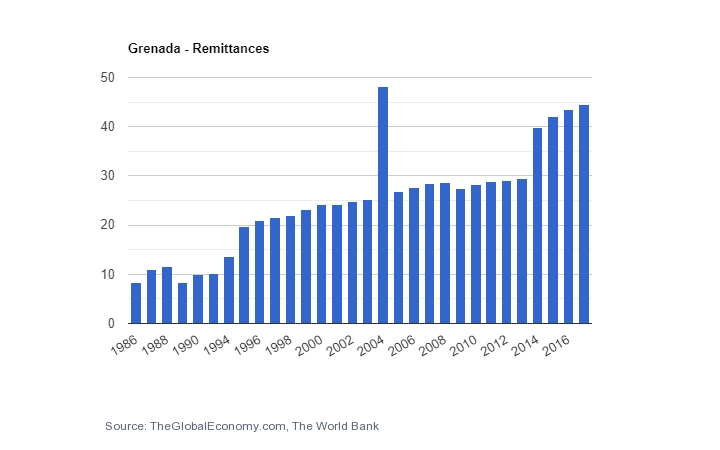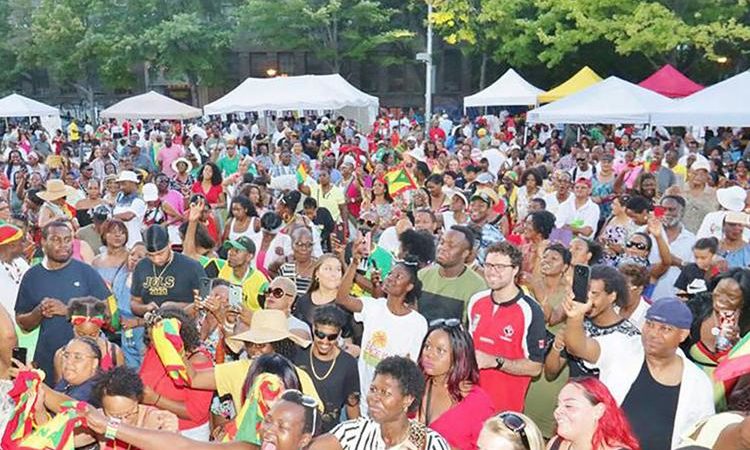We are facing a global pandemic of epic and unprecedented proportions. The Grenadian diaspora is one of the many groups hurting but here’s why every Grenadian should be worried. According to world bank statistics, from 1896-2017, the Grenadian diaspora contributed an average of 25.04 million US dollars (~XCD 67 million) to Grenada’s economy with 48 million recorded after the passage of hurricane Ivan in 2004. Statistics also show that these remittances steadily increased from then onwards (see figure below).

These figures, however, are only the tip of the iceberg when it comes to the true value of the diasporas contributions, as these figures only capture funds remitted (sent) through official channels like moneygram, western union and financial institutions. It does not consider;
• monies that would have been sent undeclared in envelopes in the mail
• via travelling friends and family members
• the value of barrels sent throughout the year
• the value of charitable contributions and donations (equipment etc) from the numerous diaspora organizations scattered across the globe
• foreign exchange currency spent by returning nationals in the rural community throughout the year but especially at Christmas, Easter, Spicemas and around other emerging festivals like the Grenada Music Festival.
These remittances play a vital role in improving the living conditions of many on island. One only needs to take a look at the cries for a ‘moneygram day’ amid the lockdown and the resulting persistently long lines at money remittance agencies including Western Union for proof. The truth is, many Grenadians depend on these remittances for their basic needs, to send kids to school, to care for the elderly, to start small business and to access healthcare.
With major diaspora centers like New York, England and to a lesser extent Canada reporting increasing deaths from the coronavirus and massive job losses (many of whom will not qualify for government stimulus funds because of their illegal status), Grenada’s economy stands to receive another blow from reduction in the volume and frequency of these remittances amid this crisis. Even if we were to return to ‘normal’ by August/September, the disposable income of many in the diaspora would have been severely impacted as they simply try to survive and keep a roof over their heads during this crisis.
This reduced disposable income has implications as well for the tourism industry; diaspora tourism i.e. people who travel on holidays to destinations where they have an ancestral connection or where they were born, locally known as ‘JCB’s (just come back)’ in Grenada, has been rapidly increasing with the rise in popularity of cultural events like Spicemas, Carriacou & Petite Martinique Carnival and the Grenada Music Festival. Travel plans for 2020 will have been interrupted and likely will also be impacted for 2021 depending both on how long travel restrictions due to the virus continue to be in place and whether job loss is temporary or permanent in the ‘new normal post-COVID’.
Diaspora direct investments in the economy through savings in credit unions, banks and other investments like real estate will also likely show signs of slowing as the world officially dips into a global recession. Other areas like diasporas plans to return to the island to live would also be impacted. A slowing economy and concerns over the healthcare capacity of the island (which on a normal day is already a concern for the diaspora), to deal with any potential spike in infection rates will certainly have nationals rethinking any plans to return for the near future.
The capacity of diaspora organizations to fundraise for charitable projects in Grenada will also be severely impacted for the short and possibly medium term. Many have already had to cancel fundraising events and will likely need to do so for the rest of 2020 as host country governments implement social and physical distancing rules. With traditional event patrons themselves suffering hardships, diaspora organizations will have to make hard decisions about the type and cost of these events moving forward and may even decide to shift focus to their diaspora constituents rather than Grenada.
Organizers of large scale diaspora cultural festivals like the Grenada day festivals in Toronto, Montreal, Calgary, New York, London and other cities will also have to take a hard look at the viability of these festivals for 2020 given physical and social distancing rules now in place. Most mass gatherings have been prohibited at the government level in an effort to slow the spread of the virus. This also represents a loss for the diaspora of opportunities to engage and reconnect with each other and by extension strengthen ties with home/countries of origin.
In summary, the impact of these COVID-related difficulties being experienced by the diaspora is multifaceted and will make economic recovery for islands like Grenada doubly difficult, post-COVID. Normally, in response to disasters, countries of origin could count on the diaspora to provide collective remittances, goods and services to help with recovery and reconstruction (see figure above). This pandemic has turned this dynamic on its head, the diaspora too are severely impacted. What remains to be seen, is whether these impacts will be for the short or long term, either way, it’s best to be prepared as things will definitely get worse before they get better.
